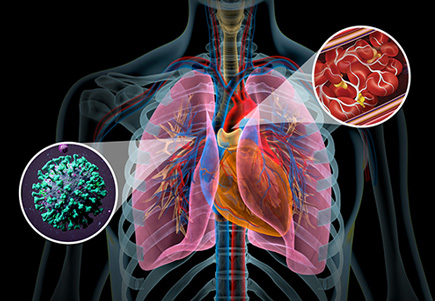COVID-19 Prioritized Care

As the Covid-19 pandemic continues, and the impact of the variant strains remains unknown, the comorbidities associated with SARS-CoV-2 infection continue to impact the lives of people around the world every day. The most common and devastating comorbidities are pneumonia, acute respiratory distress syndrome (ARDS), myocardial infarction (MI), and sepsis. No reliable biomarkers are available for ARDS however, markers for the other conditions are in routine clinical use.
The markers listed here have been studied together to help assess the potential severity of Covid-19 infection and aid in the risk stratification of those patients. Each marker is well-established in its own area of medicine, but several recent studies indicate that together they may be beneficial to identify Covid-19 patients with the greatest likelihood of severe disease.
Scripps Laboratories is a leading provider of proteins and antibodies to research, biotech, and clinical diagnostic entities worldwide. Our customer service, technical support, and on-time delivery are unmatched and are part of our commitment to assist you in your research and to help get your products manufactured on-schedule and ready for distribution.
Use the links below to view details about each of these products. If you have any questions or would like any technical information, please don’t hesitate to contact us: Customer Support.
Assays for serum and plasma levels of the MB isoform of Creatine Kinase (CK-MB) have long been used to diagnose MI. CK-MB is produced primarily by cardiac myocytes and, upon damage to cardiac tissue, CK-MB is released into circulation. Plasma levels begin to rise approximately 3 hours after MI, peak within about 24 hours, then return to normal levels after 2-3 days. In several recent Covid-19 studies, CK-MB has proven useful, along with other cardiac biomarkers, in helping identify patients experiencing MI.
C-Reactive Protein (CRP) was associated with acute bacterial infections and identified as a marker of inflammation as early as 1930. Since then, it has been associated with a number of conditions, including pneumonia, sepsis, MI, unstable angina, stroke, atherosclerosis, and coronary heart disease. Each of these conditions is a potential comorbidity factor for Covid-19 patients, making CRP determinations a critical part of risk stratification.
Myoglobin is an iron- and oxygen-binding protein found in skeletal and heart muscle. Although it is not specific to the heart, myoglobin is a highly valued cardiac marker. It is released from damaged heart muscle early during the course of MI and is detectable as soon as 2 hours after the cardiac event. With Covid-19, serum levels of myoglobin help to identify quickly those patients undergoing a cardiac event.
Natriuretic peptides are produced by heart tissue and have demonstrated effectiveness in assessing patient risk in heart failure and in monitoring a cardiac patient's response to therapy. NT-proBNP is the non-active, prohormone form of BNP (Brain, or B-Type, Natriuretic Peptide) and is proving to be the most efficacious of the natriuretic peptides in monitoring and treating individuals undergoing cardiac care. In several Covid-19 studies, NT-proBNP is showing promise as an independent biomarker of a poor outcome.
Immunoassays for cardiac Troponins I (TnI) and T (TnT) are widely used in the diagnosis of MI. Like CK-MB, TnI and TnT levels begin to rise approximately 3 hours post-MI, they peak at 24-48 hours, but, unlike CK-MB, TnI and TnT levels can remain elevated for as long as 5-14 days. In Covid-19, TnI and TnT are proving useful as independent markers of mortality, as they indicate cardiac complications.





